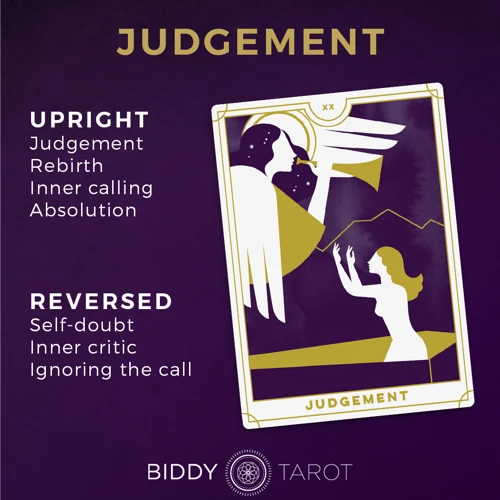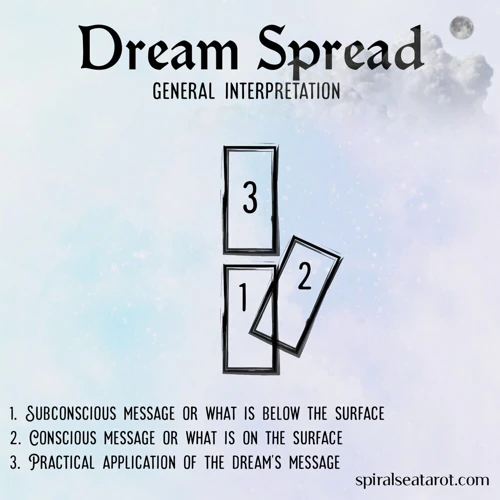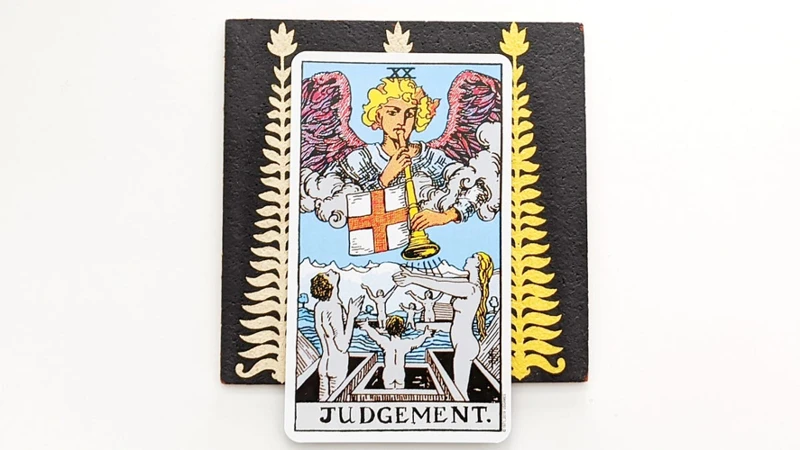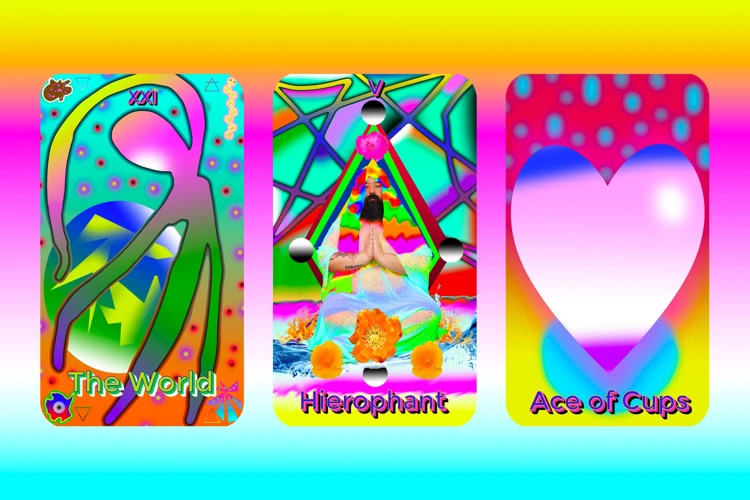Welcome to the mystical realm of tarot, where each card holds an array of symbols and meanings waiting to be deciphered. In this enlightening article, we delve into the intriguing world of the Judgement card, exploring its symbolism and the profound messages it holds. This card acts as a bridge between the past and the future, inviting us to engage in introspection and self-evaluation. By understanding the significance of the Judgement card, we can embark on a transformative journey towards personal growth, acceptance, and the embrace of new beginnings. Join us as we unravel the mysterious elements of this card and unlock its secrets of self-discovery and profound change.
Contents
- What is the Judgement Tarot Card?
- Interpreting the Symbolism
- Self-Evaluation and Awakening
- A Call for Transformation
- Embracing Meaningful Connections
- Conclusion
-
Frequently Asked Questions
- 1. How does the Judgement Tarot card relate to self-evaluation?
- 2. What does the angel in the Judgement card symbolize?
- 3. What is the significance of the trumpets in the Judgement card?
- 4. How does the Judgement card relate to letting go of the past?
- 5. Can the Judgement card represent a turning point in one’s life?
- 6. How does the Judgement card differ from the Devil card?
- 7. Can the Judgement card signify forgiveness and reconciliation?
- 8. Does the Judgement card have any connection to spirituality?
- 9. How can the Judgement card empower individuals to embrace personal growth?
- 10. Can the Judgement card symbolize collective change?
- References
What is the Judgement Tarot Card?

The Judgement Tarot card is a powerful and transformative symbol within the Tarot deck. Represented by a serene angel, floating above a vast expanse of water, this card signifies a moment of awakening and self-evaluation. The angel’s presence is often seen as a divine call to action, urging individuals to reflect on their past decisions and actions. The sound of the angel’s trumpets echoes through the card, symbolizing the need for a wake-up call or a moment of realization. Surrounding the angel are individuals, rising from their coffins, symbolizing rebirth and the opportunity for transformation. This card signifies a period of personal reflection and self-assessment, prompting us to examine our past choices and evaluate our current path. The Judgement Tarot card represents a turning point, inviting us to let go of the past and embrace new beginnings. Its energy is reminiscent of other re-evaluative cards in the Tarot, such as The Devil, which urges us to confront our shadow selves, and The Emperor, which encourages us to take control of our lives. Through its symbolism and imagery, the Judgement Tarot card serves as a guide on the journey of self-realization and transformation.
Interpreting the Symbolism

Interpreting the symbolism of the Judgement Tarot card requires a deep understanding of its intricate elements. The angel at the center of the card represents divine intervention and spiritual awakening. Their outstretched arms signify a moment of revelation and judgement, as they call upon individuals to evaluate their thoughts, actions, and choices. The trumpets in the angel’s hands symbolize the need for attention and awareness, urging us to listen to our inner voice and heed the call for self-reflection. The people emerging from their coffins represent rebirth and transformation, suggesting that it is never too late to make a change. This symbolism of resurrection aligns with the message of the card: the opportunity for a renewed beginning. Exploring the symbolism of the Judgement Tarot card can lead us to introspection and understanding, guiding us on the path to self-discovery and spiritual growth. For further guidance on spiritual matters, we can look to The Hierophant card in the Tarot deck.
1. The Angel
The presence of the angel in the Judgement Tarot card holds significant symbolism and represents a divine calling or intervention. The angel embodies a sense of purity, spirituality, and guidance. Floating gracefully above the earth, the angel serves as a messenger, delivering a powerful message of awakening and transformation. Their serene and tranquil expression conveys a sense of divine wisdom and enlightenment. The angel’s role in this card is to call individuals to reflect on their actions and choices, encouraging them to evaluate their lives honestly. They act as a symbol of spiritual connection, reminding us of the importance of aligning our actions and decisions with higher principles. The angel’s presence serves as a reminder that there is a higher power watching over us, offering guidance and support on our path to self-discovery and growth.
2. The Trumpets
The trumpets in the Judgement Tarot card hold significant symbolism. They are depicted as powerful instruments being blown by the angel in the card. These trumpets represent a call to action, a wake-up call that demands attention and signals a moment of realization. The sound of the trumpets is often associated with divine intervention or a higher power guiding us towards self-discovery and transformation. In the context of the Judgement card, the trumpets serve as a reminder for individuals to assess their lives, beliefs, and actions. They prompt us to reflect on our past choices and behaviors, and to consider the consequences they have had on our lives and the lives of others. The trumpets also signify the need for honest self-evaluation and the urgency to make necessary changes. They offer an opportunity to break free from negative patterns, embrace personal growth, and embark on a journey of transformation. Through their powerful imagery, the trumpets in the Judgement Tarot card symbolize the awakening and empowerment that comes with acknowledging the need for change and taking decisive action.
3. The People
The presence of the people in the Judgement Tarot card is an important element that adds depth and meaning to its symbolism. As the angel calls forth the awakening, the people depicted in the card symbolize humanity as a whole. They can represent the diverse perspectives, experiences, and journeys that individuals undertake in life. Each person rising from their coffin signifies a rebirth or resurrection, suggesting that all individuals have the potential for personal growth and transformation. The people in the Judgement card may also symbolize the collective consciousness or the interconnectedness of humanity. It reminds us that our actions and choices not only impact our own lives but also have broader implications for society as a whole. This encourages a sense of responsibility, empathy, and understanding towards others. The presence of the people in the Judgement card serves as a reminder that we are not alone in our journey and that the choices we make can contribute to the greater good.
Self-Evaluation and Awakening

Self-evaluation and awakening are central themes embodied by the Judgement Tarot card. This card prompts us to engage in deep introspection and reflection, encouraging us to assess our choices, actions, and beliefs. It serves as a reminder that true transformation begins from within. Through self-evaluation, we gain a better understanding of who we are, what we desire, and where we are headed. This process of introspection allows us to awaken to our own potential and the possibilities that lie before us. It invites us to let go of self-limiting thoughts and beliefs, and embrace personal growth. By embarking on this journey of self-discovery and self-awareness, we can break free from old patterns, release stagnant energy, and open ourselves up to new possibilities. This call to self-evaluation and awakening, as represented by the Judgement card, is an invitation to seek truth, align with our authentic selves, and embark on a path towards personal transformation and fulfillment.
1. Reflection and Assessment
When the Judgement card appears in a tarot reading, it serves as a gentle yet powerful reminder to engage in deep introspection. This is a time for self-reflection and honest assessment of our thoughts, actions, and choices. It encourages us to take a step back from our daily routines and immerse ourselves in self-examination. Reflecting on our past experiences allows us to gain valuable insights into our patterns, behaviors, and motivations. We can ask ourselves thought-provoking questions: What have we learned from our past mistakes? How have our decisions shaped our present circumstances? What aspects of our lives are no longer aligned with our true selves? Through this reflection, we can gain clarity about our values, desires, and aspirations. It’s important to approach this process without judgment, practicing self-compassion and understanding. Taking the time for introspection helps us to objectively evaluate our strengths, weaknesses, and areas for improvement. This self-assessment lays the foundation for personal growth and transformation, allowing us to make conscious choices that align with our authentic selves.
2. Embracing Personal Growth
Embracing personal growth is a fundamental aspect of the Judgement Tarot card. This card serves as a catalyst for self-reflection and encourages individuals to embark on a journey of self-improvement. It beckons us to embrace our strengths, weaknesses, and areas for growth.
1. Cultivating Awareness: The Judgement card prompts us to become aware of our thoughts, emotions, and behaviors. By acknowledging our patterns and habits, we gain insights into areas where personal growth is needed. This awareness allows us to make conscious choices and take responsibility for our actions.
2. Seeking Inner Wisdom: The Judgement card reminds us to tap into our inner wisdom and intuition. It encourages us to listen to our inner voice, trust our instincts, and make decisions aligned with our true selves. Embracing personal growth means learning to honor and trust our inner guidance system.
3. Embracing Challenges: Personal growth often arises from facing challenges and stepping outside our comfort zones. The Judgement card implores us to embrace these challenges and see them as opportunities for growth. It reminds us that growth occurs when we are willing to confront and overcome obstacles in our lives.
4. Setting Goals: A crucial aspect of personal growth is setting meaningful goals. The Judgement card encourages us to envision the kind of person we want to become and to set intentions and goals that align with our vision. By setting realistic and achievable targets, we can take proactive steps towards personal development.
5. Embracing Self-Compassion: Personal growth requires self-compassion and acceptance. The Judgement card teaches us to be gentle with ourselves and to embrace self-love and forgiveness. It reminds us that mistakes and setbacks are part of the growth process, and we should approach ourselves with kindness and understanding.
Embracing personal growth is a continuous journey that requires dedication, self-awareness, and a willingness to evolve. The Judgement card serves as a reminder that transformation is possible when we embrace personal growth and embark on the path of self-improvement.
3. Breaking Free from Limitations
Breaking free from limitations is a key theme within the Judgement Tarot card. As the angel calls upon individuals to rise from their coffins, it serves as a powerful metaphor for breaking free from the confines of our own self-imposed limitations. This card encourages us to shed the beliefs and patterns that hold us back, allowing us to step into a new and liberated version of ourselves.
To break free from limitations, we must first recognize and acknowledge the areas in which we feel restricted. This could be in our mindset, our relationships, or even our career paths. The Judgement Tarot card prompts us to reflect on these limitations and evaluate whether they align with our true desires and aspirations. By doing so, we can gain clarity and begin the process of liberation.
Once we have identified the limitations, the next step is to take the necessary actions to overcome them. This may involve challenging our fears, stepping outside of our comfort zones, or seeking support and guidance from others. The Judgement Tarot card reminds us that we have the power and strength within us to transcend these limitations and embark on a path of personal growth and transformation.
Breaking free from limitations is not always easy, but it is a necessary step in our journey towards self-realization. It requires us to let go of old beliefs and embrace new possibilities. The Judgement Tarot card serves as a guiding light, encouraging us to release the constraints of the past and embrace a future filled with unlimited potential. Through this process of breaking free, we can discover our true selves and experience a profound sense of freedom and fulfillment.
A Call for Transformation

The Judgement Tarot card serves as a profound call for transformation, beckoning us to embrace change and let go of the past. It emphasizes the importance of accepting the inevitability of change and the need to release ourselves from the shackles of past experiences and limitations. By accepting the call for transformation, we open ourselves up to new possibilities and opportunities for growth. The Judgement card invites us to step out of our comfort zones and embrace the unknown, recognizing that true transformation can only occur when we are willing to leave behind what no longer serves us. This card reminds us that change is not to be feared but rather embraced as a catalyst for our personal evolution. It shares a similar essence with other transformative cards in the Tarot deck, such as The Hermit and Death, both of which encourage us to let go of what is familiar and embark on a journey of self-growth and reinvention. The call for transformation echoed by the Judgement Tarot card is an invitation to break free from stagnant patterns, embrace new beginnings, and embark on a soul-stirring journey of self-discovery.
1. Accepting Change
When it comes to the Judgement Tarot card, accepting change is a key aspect of its message. This card serves as a gentle nudge for individuals to embrace the inevitability of change in their lives. Change can be both thrilling and unsettling, but it is through acceptance that we can find growth and transformation. The Judgement card encourages us to let go of resistance and open ourselves up to the possibilities that lie ahead. It reminds us that clinging to the past can hinder our progress and prevent us from experiencing new beginnings. By accepting change, we allow ourselves to break free from stagnation and move towards a more fulfilling future. This process often involves shedding old beliefs, habits, and attachments that no longer serve us. Embracing change can be challenging, as it requires stepping out of our comfort zones and confronting the unknown. However, the Judgement Tarot card reminds us that by accepting change, we unlock the potential for personal growth, self-discovery, and profound transformation.
2. Releasing the Past
Releasing the past is a crucial aspect of the transformative energy embodied in the Judgement Tarot card. When confronted with the call to let go of past experiences and patterns, it can be a challenging but necessary step towards personal growth. In order to fully embrace new beginnings, we must first release any emotional baggage or attachments that hold us back. This process involves acknowledging and accepting the lessons learned from the past, understanding that dwelling on what could have been or what should have been only impedes our progress. By forgiving ourselves and others for past mistakes or hurts, we create space for healing and growth. Letting go of resentment or regrets allows us to move forward with clarity and renewed energy. The Judgement card encourages us to embrace the present moment and trust in the possibilities of the future, unburdened by the weight of the past. Through intentional reflection, meditation, or seeking support from trusted individuals or professionals, we can cultivate the strength to release the past and step into a brighter, more authentic version of ourselves.
3. Embracing New Beginnings
Embracing new beginnings is a significant aspect of the Judgement Tarot card’s message. After undergoing self-evaluation and reflecting upon past choices, this card encourages individuals to release the burdens of the past and embrace a fresh start. The symbolism of the angel and the rising individuals in the card signifies a rebirth and the opportunity for personal transformation. This is a time to let go of old patterns, beliefs, and limitations that no longer serve us. It is an invitation to step into the unknown with courage and optimism, trusting that the universe will guide us towards a brighter future. Embracing new beginnings can be both exhilarating and challenging, as it requires us to step out of our comfort zones and embrace change. It involves taking risks, exploring new possibilities, and being open to the opportunities that come our way. This process of transformation can lead to personal growth, expanded horizons, and a deeper sense of fulfillment. The Judgement Tarot card reminds us that when we let go of the past and welcome new beginnings, we create space for miracles and possibilities to unfold in our lives. It is an invitation to embrace change wholeheartedly and embark on a journey of self-discovery, empowerment, and evolution.
Embracing Meaningful Connections
In the realm of the Judgement Tarot card, the journey towards self-evaluation and transformation extends beyond individual growth and extends towards the realm of connections with others. Embracing meaningful connections is a vital aspect of this transformative process, offering opportunities for healing, reconciliation, and collective change. The Judgement card emphasizes the importance of healing and reconciliation, encouraging individuals to mend broken relationships and find solace in forgiveness. Through open-hearted communication and a willingness to understand the perspectives of others, meaningful connections can be reestablished and old wounds can be healed. This card also calls for the embrace of forgiveness, both towards others and ourselves. By releasing grudges, resentments, and lingering baggage, we create space for new beginnings and genuine connections to flourish. The Judgement card inspires individuals to take part in enacting collective change. By recognizing our interconnectedness and embracing a sense of unity, we can work together to create a more harmonious and compassionate world. Whether it’s through small acts of kindness or participating in larger movements for social justice, the Judgement Tarot card urges us to use our voices and actions to make a positive impact. As we embrace meaningful connections, we contribute to the collective transformation of society and foster a brighter future for all.
1. Healing and Reconciliation
1. Healing and Reconciliation
The Judgement Tarot card carries a profound message of healing and reconciliation, highlighting the potential for inner and outer harmony. When this card appears in a tarot reading, it signifies a need for individuals to confront and address unresolved emotions, conflicts, or relationships. It serves as a reminder that forgiveness and understanding are crucial steps towards personal growth and transformation.
Healing is a process that requires self-reflection, compassion, and a willingness to release past grievances. The Judgement Tarot card encourages individuals to examine their wounds and embrace the opportunity for self-forgiveness. By acknowledging our own pain and understanding the perspectives of others, we can pave the way for reconciliation both within ourselves and with those who have played a significant role in our lives.
Reconciliation, in the context of the Judgement card, is not solely about repairing broken relationships but also about finding inner peace and accepting the imperfections of ourselves and others. It reminds us that closure and resolution can be achieved through open-hearted conversations, empathy, and a genuine desire to heal.
The path to healing and reconciliation is not always easy, but the Judgement Tarot card provides guidance and encouragement along the way. It reminds us that by acknowledging our wounds, embracing forgiveness, and fostering empathy, we can create space for transformation and cultivate meaningful connections in our lives.
This theme of healing and reconciliation is echoed in other tarot cards as well, such as the Justice card, which emphasizes the importance of balance and fairness, and the Hierophant card, which symbolizes the wisdom of tradition and spiritual guidance. The Judgement Tarot card invites us to embark on a journey of self-healing and reconciliation, ultimately leading to a profound understanding of ourselves and others.
2. Embracing Forgiveness
Embracing forgiveness is a vital aspect of the transformative power of the Judgement Tarot card. Within this card, we can find a call to release resentment and grudges, allowing ourselves and others to heal. Forgiveness is not about condoning the actions that have caused pain; rather, it is a conscious decision to let go of the negative emotions that hold us back. When we embrace forgiveness, we free ourselves from the burden of carrying bitterness and anger. This process can be challenging and may require deep introspection, understanding, and empathy. By forgiving ourselves and others, we create space for healing and growth to occur. The Judgement Tarot card reminds us that forgiveness is a profound act of self-liberation, enabling us to move forward with clarity, compassion, and a renewed sense of purpose. It is through forgiveness that we can truly embrace the transformative power of the Judgement card and open ourselves to profound personal and collective change.
3. Enacting Collective Change
Enacting collective change is a crucial aspect of the Judgement Tarot card’s message. This card calls upon us to recognize our interconnectedness and the power we possess to make a positive impact on a larger scale. To enact collective change, we must first acknowledge the need for it and understand that our actions and choices ripple outward, affecting not only ourselves but also the world around us. The Judgement card reminds us that our voices matter and that we have the ability to inspire and mobilize others towards a common goal. By coming together, whether in grassroots movements, community initiatives, or global activism, we can amplify our efforts and bring about meaningful transformation. The Judgement Tarot card implores us to support causes that align with our values, challenge oppressive systems, and promote equality and justice. It encourages us to foster empathy, compassion, and understanding, creating a more compassionate and harmonious world. Embracing the message of the Judgement card involves actively participating in collective action, whether through advocacy, volunteering, or supporting organizations dedicated to social change. By enacting collective change, we contribute to the evolution of society, paving the way for a brighter and more inclusive future for all.
Conclusion
In conclusion, the Judgement Tarot card holds profound significance in the realm of self-evaluation and transformation. Through its powerful symbolism and messages, this card invites us to reflect on our past, assess our present actions, and embrace the potential for personal growth. It serves as a reminder that change is not only possible but necessary for our own evolution. By accepting and releasing the burdens of the past, we open ourselves up to new beginnings and meaningful connections. The Judgement card urges us to listen to the call for transformation, to let go of limitations, and to embrace the opportunities for healing and reconciliation. It is a card of forgiveness, both for ourselves and others, and a catalyst for enacting collective change. By embracing the lessons and messages of the Judgement Tarot card, we can embark on a journey of self-discovery and empowerment, unlocking our true potential and transforming our lives in profound ways.
Frequently Asked Questions
1. How does the Judgement Tarot card relate to self-evaluation?
The Judgement Tarot card represents a moment of self-reflection and evaluation. It encourages individuals to assess their past choices and actions, gaining insight into their personal growth and development.
2. What does the angel in the Judgement card symbolize?
The angel in the Judgement card symbolizes divine guidance and a call to action. It represents a higher spiritual power inviting individuals to awaken to their true potential and make transformative changes in their lives.
3. What is the significance of the trumpets in the Judgement card?
The trumpets in the Judgement card symbolize a wake-up call or moment of realization. They announce a transformative period, urging individuals to pay attention to the messages and lessons being presented to them.
4. How does the Judgement card relate to letting go of the past?
The Judgement card signifies the importance of releasing the past and embracing new beginnings. It encourages individuals to confront and heal from past traumas, allowing them to move forward with clarity and purpose.
5. Can the Judgement card represent a turning point in one’s life?
Yes, the Judgement card often represents a significant turning point in an individual’s life. It signifies a moment of awakening, where they are called to assess their path, make positive changes, and embark on a new, transformative journey.
6. How does the Judgement card differ from the Devil card?
While both cards emphasize self-reflection and transformation, the Judgement card focuses on awakening and embracing new beginnings, while the Devil card highlights the need to confront our shadow selves and overcome temptations.
7. Can the Judgement card signify forgiveness and reconciliation?
Yes, the Judgement card can represent forgiveness and healing. It encourages individuals to let go of grudges, reconcile with past conflicts, and foster meaningful relationships based on understanding and compassion.
8. Does the Judgement card have any connection to spirituality?
Yes, the Judgement card often carries spiritual significance. It represents a divine call to step into one’s true purpose, inviting individuals to connect with their higher selves and embrace a path of spiritual growth and enlightenment.
9. How can the Judgement card empower individuals to embrace personal growth?
The Judgement card serves as a catalyst for personal growth by encouraging individuals to reflect on their past choices, embrace change, and take responsibility for their actions. It empowers individuals to make positive transformations and evolve into their best selves.
10. Can the Judgement card symbolize collective change?
Yes, the Judgement card can represent collective change and transformation. It signifies a call for unity and collaboration to bring about positive shifts within society and enact meaningful change for the greater good.






